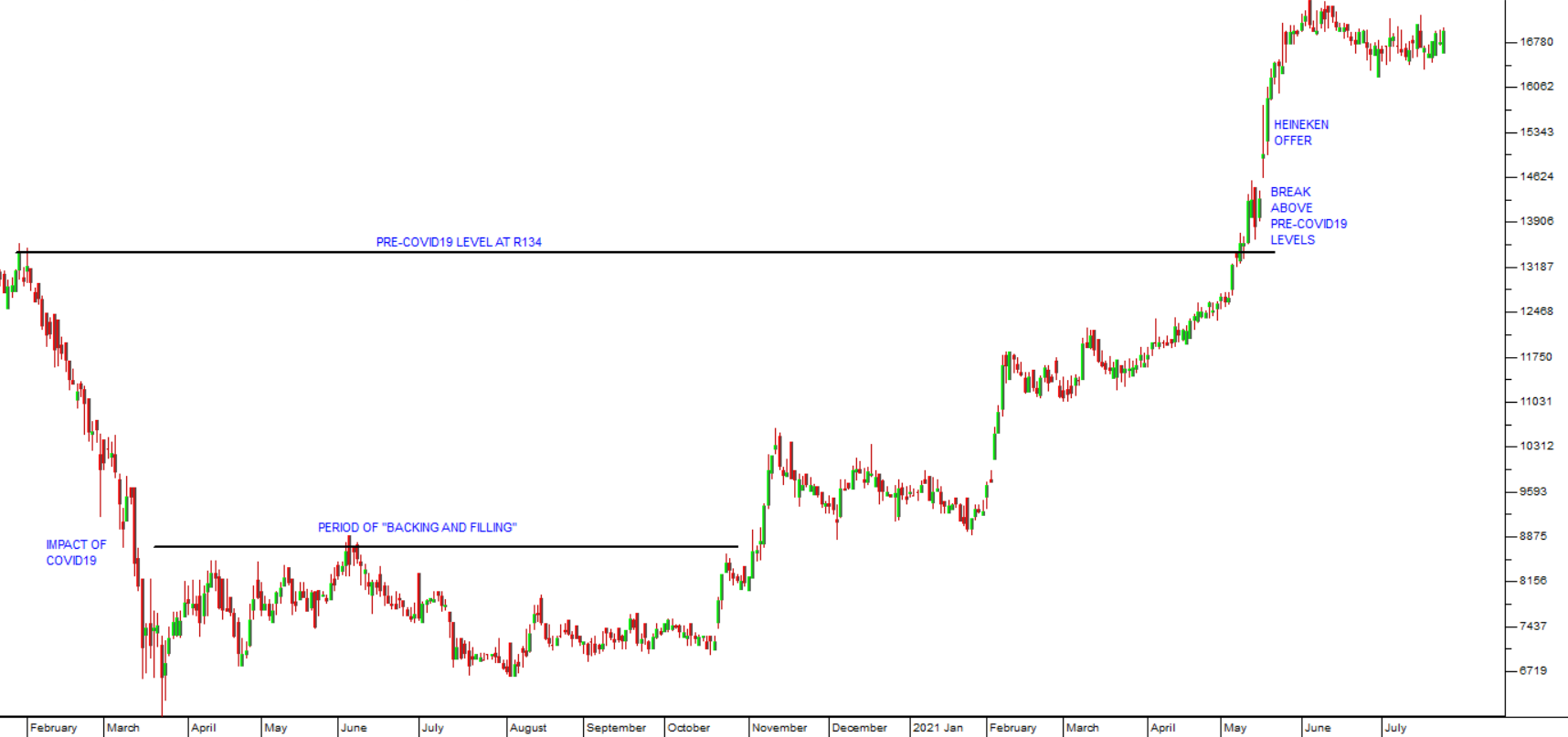Distell
26 July 2021 By PDSNETQuality of management is a vital indicator for the private investor. High quality management is the best guarantee of future profits and sustainability in any share, especially in the volatile and unpredictable environment of South Africa. COVID-19 and the recent civil unrest have given investors a unique opportunity to evaluate the quality of management in JSE-listed blue chip shares.
One of the best of these has been the Remgro-controlled alcohol supplier, Distell. The company is well-known for its brands like Amarula, Nederburg, Klipdrift and Savanna. In the light of its trading statement for the year to 30th June 2021 published on Friday (23-7-21), it is interesting to consider how well management has coped with the combined challenges of COVID-19, the multiple bans on alcohol sales and then the civil unrest.
Consider the chart:

You can see here that COVID-19 had an enormous impact on the company and its shares. Like many other blue chips, the share collapsed in February and March of 2020 and then went through a period of “backing and filling” as the impact of the pandemic was absorbed and assessed by investors. Then, as the way forward became clear and with the effective interventions by management, the share began to rise in November 2020, climbing steadily to above the pre-COVID-19 levels before Heineken made its offer.
The offer (made on 18th May 2021), of course, caused the share to climb sharply to new highs around R170. No details have yet been made available of what the deal might be, but the company remains under cautionary and it seems probable that Remgro will take the opportunity to cash in its chips at a price which is well above the pre-offer price level.
The trading statement will obviously enable Remgro to negotiate from a position of strength. In that announcement Distell was able to estimate that headline earnings per share (HEPS) would be 232% above the 2020 level and 20% above the 2019 level – which is a remarkable achievement given the various costly alcohol bans resulting in 20% fewer trading days.
Amazingly, the company has also managed to reduce its debt from R5,9bn to just R2,3bn over the year. Given the trading environment over the past year, this is a remarkable achievement.
That is not to say that this business is without problems. The bans on alcohol have stimulated the illegal liquor industry which now comprises about 22% of the market. It has also entrenched the activities of organized crime especially in informal settlements.
The fact that roughly 60% of every rand of Distell’s sales ends up in the government’s coffers through a variety of taxes, means that this has impacted directly on the Treasury and South Africa’s debt position.
Perhaps the best summation is given in the following statement by the company:
“The Group’s agility to respond in the face of major business disruption enabled by strategic investments in RTM (route-to-market), brand development, innovation, true supplier partnerships and supply chain optimization supports our confidence in our ability to fully recover and compete effectively in the long-term.”
What you can learn from this, as a private investor, is that calamities are characterised by high risk, but they highlight excellent management and usually represent a clear buying opportunity. The extraordinary V-bottom of COVID-19 was just such an opportunity which we drew your attention to at the time in our article of 13th March 2020 when we said: “my expectation is that we will see a “V-bottom” in the chart with a relatively short period of “backing and filling” before a new upward trend commences. And I expect that upward trend to be much more rapid than the usual recovery phase”.
DISCLAIMER
All information and data contained within the PDSnet Articles is for informational purposes only. PDSnet makes no representations as to the accuracy, completeness, suitability, or validity, of any information, and shall not be liable for any errors, omissions, or any losses, injuries, or damages arising from its display or use. Information in the PDSnet Articles are based on the author’s opinion and experience and should not be considered professional financial investment advice. The ideas and strategies should never be used without first assessing your own personal and financial situation, or without consulting a financial professional. Thoughts and opinions will also change from time to time as more information is accumulated. PDSnet reserves the right to delete any comment or opinion for any reason.
Share this article:
.png)
.png)
.png)